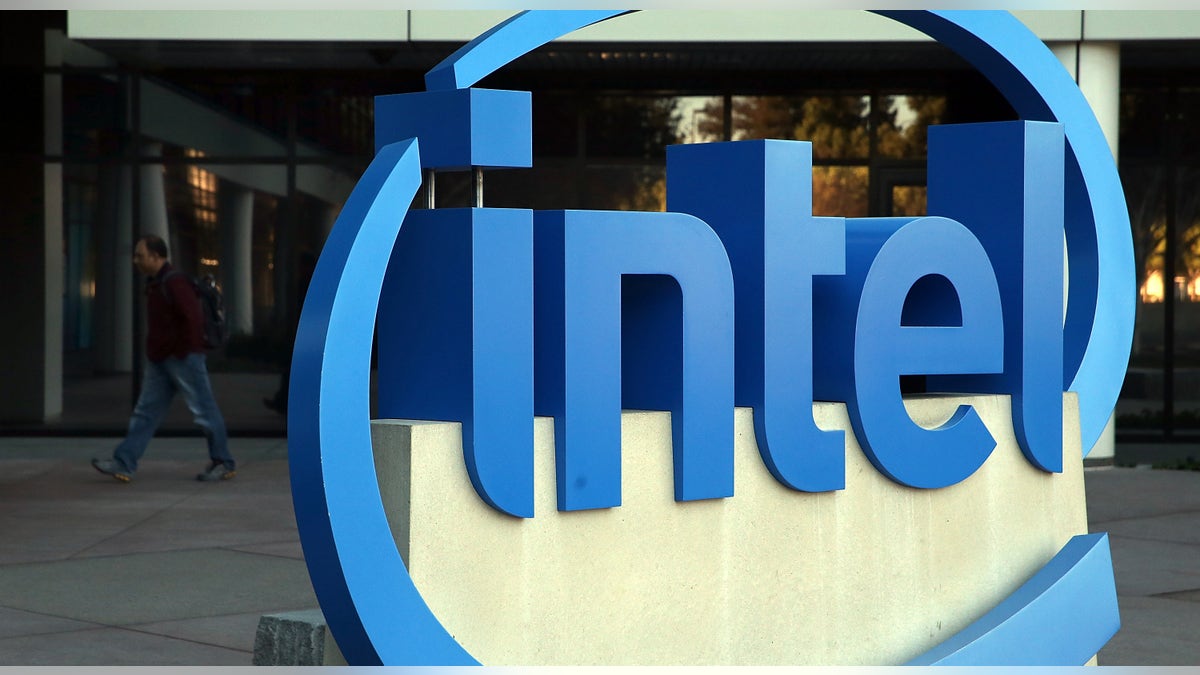
File photo: SANTA CLARA, CA - JANUARY 16: The Intel logo is displayed outside of the Intel headquarters on January 16, 2014 in Santa Clara, California. (Photo by Justin Sullivan/Getty Images) (2014 Getty Images)
There’s a race brewing in Silicon Valley to create the best quantum computer — one that could change the world by making the impossible possible — and some big gains in that race were just announced at CES.
Intel CEI Brian Krzanich announced Monday evening in a CES keynote presentation that the company is neck-in-neck with other competitors in the race to make universal quantum computers that can solve problems that are impossible on today’s supercomputers. The semiconductor giant is competing against Google, IBM and other companies to reach “quantum supremacy,” the marker at which universal quantum computers outpace traditional computers that represents an important Kitty Hawk moment for data processing.
Krzanich said the company has created a 49-qubit quantum computing chip and have shipped it to their partners for use testing, representing a big step in quantum computing for the company.
CES 2018: NEW TECH YOU CAN USE THIS YEAR
“Quantum computing represents a completely different approach to computing. This technology will be able to solve problems that are insurmountable today,” Krzanich said in his speech. “Just as we ushered in the era of our classical personal computing, we’re pushing the boundaries of the quantum computing revolution.”
Quantum computers aren’t like the computers at your workplace, or even like supercomputers currently used to model weather or run academic simulations. They are an entirely different flavor of computers, and while they’ll never be used to power your laptop or phone, their awe-inspiring potential comes from using quantum physics to solve problems that would be entirely impossible on even the most powerful traditional supercomputer.
What are those impossible problems? Simulating the side effects of pharmaceutical drugs, simulating catalysts that speed up chemical reactions (which can lead to more energy-efficient applications) and breaking cryptography, Mike Mayberry, corporate vice president and managing director of Intel Labs told Fox News. Krzanich said one potential use is for research into better-quality materials, such as more efficient superconductors.
It’ll still be five years before quantum computing can tackle engineering problems and a decade or more before quantum computing can affect commercial industries, Mayberry said, but several companies are racing toward the day when commercial applications are commonplace. IBM announced earlier this year it had created its own 50-qubit processor, and Google released a blueprint for a 49-qubit system in fall 2017.
“This is truly a really exciting time in quantum computing,” Jerry Chow, IBM manager of experimental quantum computing, said in an interview earlier this year. As quantum computers get more complex, Chow said they will be more useful to industries and companies, rather than only physicists and academic institutions.
Even though the finish line for the race for quantum supremacy is set at about 50 qubits, Mayberry said the journey toward useful quantum computers is just beginning. “This is a marathon, and we’re only in the first part of the race,” he said.
University of Texas Austin computer science professor Scott Aaronson said the race for quantum supremacy is exciting, but it doesn’t really matter who wins because all players will cross the finish line at about the same time. It’s really the race itself that matters.
“I find the race to achieve quantum supremacy with a 50-qubit system incredibly exciting. This will be a major milestone for the field. And while I'm sure it matters to the participants, I personally don't especially care who wins this race, only that it is won,” he said via email.
Unlike traditional computers, which require chips to be in a 0 or 1 position, quantum chips called qubits can be in a 0, 1 or both at the same time. If that sounds sci-fi, it’s because it taps into a very real but complicated sub-set of physics called quantum mechanics to work. At the smallest level of matter, physics behaves differently, almost counterintuitively, from what we see in our daily lives. Those differences, when harnessed in a quantum computer, make it possible to solve computational problems that were otherwise out of reach with traditional computers.
Intel’s announcement, which aims to let it compete with IBM and Google, pushes the company closer to the finish line for a universal quantum computer — essentially a general-purpose quantum computer. It’s important to note that D-Wave has already surpassed these companies and released a 2,000-qubit system, but since their computer is a quantum annealer that only solves a specific type of problem, they aren’t considered to be in direct competition to universal quantum computers by researchers and industry leaders.
8 AMAZING NEW AI INNOVATIONS AT CES 2018
Krzanich also discussed the development of a neuromorphic test chip, nicknamed “Loihi.” Neuromorphic chips are closer to traditional computer chips, but they are built to imitate neurons in a human brain, giving it the ability to learn as it runs.
Neuromorphic chip are expected to be able to identify objects from different angles while moving better than existing systems, he said. This ability opens the door to real-time analysis of complex data, Krzanich said.
It’s possible neuromorphic chips could be used in a product such as a smartphone in two to four years, Mayberry said.
“We’re really optimistic about what this new kind of computing can achieve over time,” Krzanich said in his presentation.








































